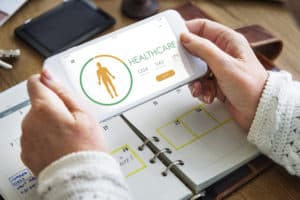The healthcare industry has embraced mobile development and it is revolutionizing how doctors and patients interact. It is extremely easy to find flaws with this new approach to healthcare. It is interfering with conversations. Do you really want Google and others to know your blood pressure? Is it time to check your blood sugar?
Amazingly, this criticism hasn’t slowed the acceptance of mobile applications in the healthcare industry. If you check the numbers, it appears that the healthcare industry will see a bigger rise in the influence of mobile application development.
-
- 66% of Americans use mobile platforms to manage their health issues. 79% would use a wearable device (Pulse of Online Health, 2015).
- Almost 100K health-related apps have been added by 13K new publishers to the market since 2015. At that moment, there had already been 259,000 medical apps in major app stores (Research2Guidance Annual mHealth Report, 2016).
- The growth of downloads slowed down in 2016 as compared to 2015 (35% to 7%) (Research2Guidance Annual mHealth Report, 2016).
The opportunity is clear. The market exists for mobile application development in the healthcare industry. Taking a closer look at the healthcare industry as a whole reveals the reasons.
Patients use mobile applications to manage their healthcare industry needs in many diverse ways. Some patients use mobile applications as a reference guide, even learning how to administer first aid. Doctors enjoy that patients are sharing their health data with them as it enables the doctor to see data they would otherwise not have available to them. Patients compare prices and find the best deals on prescriptions. They use applications to track biological information like blood pressure. They even find new doctors using mobile applications.
The number of mobile apps for healthcare has been rapidly increasing and each app has its own way of driving innovation and patient satisfaction.
Corporate Apps
Most people think of wearables when the healthcare industry and mobile applications are brought up in the same discussion. The reality is that 66% of the largest hospitals in the United States have designed and developed their own applications. Institutions like hospitals and insurance companies can build a healthcare app and profit from it. It also makes sense to develop a mobile app for a healthcare consulting firm. The only thing to keep in mind is that the app should have great UX for the consumers, and the hospital staff alike.
Related: Can mHealth Developers Mend the Rift Between Healthcare and Technology?
Insurance Mobile App Development
Data Safety
People worry about Facebook collecting their personal data, but imagine if healthcare data made it public? The issues that would create are incredible. This is why mobile developers are very focused on providing intense security measures by auditing and tracking all changes to the data.
Artificial Intelligence for the Healthcare Industry
Artificial intelligence has two main uses in the healthcare industry. Through the use of speech recognition, it is an amazing way to personalize customer care.
Health assistants help people identify their diseases. AI can also act as a reminder to take pills or do health-related procedures, building a custom plan for every user. Deep learning is being used to prevent lethal diseases at early stages.
Video Chats
Robots have not replaced humans completely. People still need doctors, and the best way to connect with them is by video calls.
There is a special cost to make a develop a healthcare application of this kind: the content from the chosen professionals should be peer-reviewed. Ideally, there must be a set of requirements for the doctors, too.
Geolocation
How much does it take to get to the nearest emergency care unit? Where can I get this antibiotic? Apps give location-based answers. Other apps use GPS to find out where you are, what you are doing, and whether this activity is against the doctors’ advice.
Wearable Technology
The healthcare industry can gain much from fitness trackers and similar apps. he market of smart fitness trackers, pulse oximeters, sugar, blood pressure, and heart rate monitors is predicted to grow by 35% in 2021
Read our related articles on how to make a fitness tracking app and how to build a wearable app.
Make it a Game
Medical routines are stressful. Working on healthy habits drives customers crazy. The answer? Play a game with them. Why just run if you can run from zombies?
Know Your Best Practices
The healthcare industry is a unique vertical. It is suggested you follow three best practices:
- Know your target audience. Apps for doctors are different from apps for patients.
- Care for customer experience. If the cost for high-quality solutions seems too high, look for other solutions.
- Use apps as part of the overall client-oriented process. End users have many other ways to connect with you rather than apps. Those ways should not to be neglected.
The healthcare industry will continue to be revolutionized by mobile application development as devices become more and more powerful. The sky’s the limit here. By considering the end result and keeping that in mind, the healthcare industry is destined for more mobile application innovation.
Related Articles:
- How to Build a Doctor’s Appointment Application
- A Guide to Building a Healthcare Application
- How to Create a Telehealth Application
- Healthcare Mobile App Design Guide
- How to Start a Healthcare Startup
- Medical Website Development Guide
- How to Make a Pharmacy Application
- HIPAA Compliant App Development Guide
